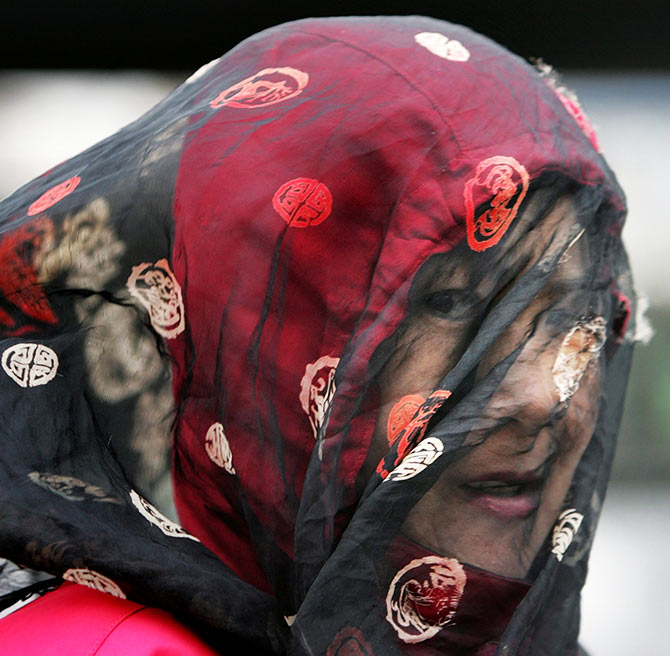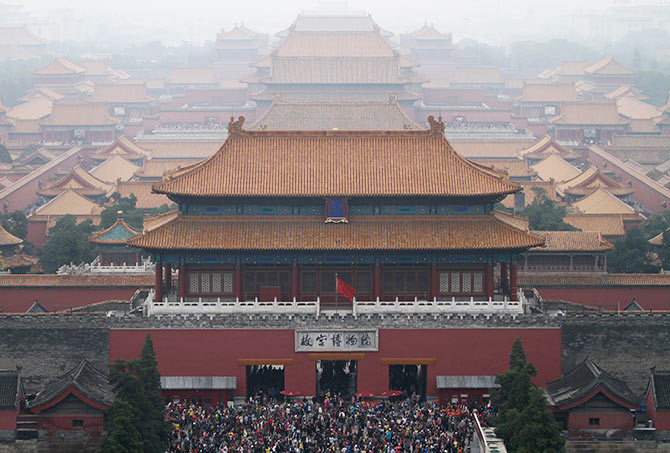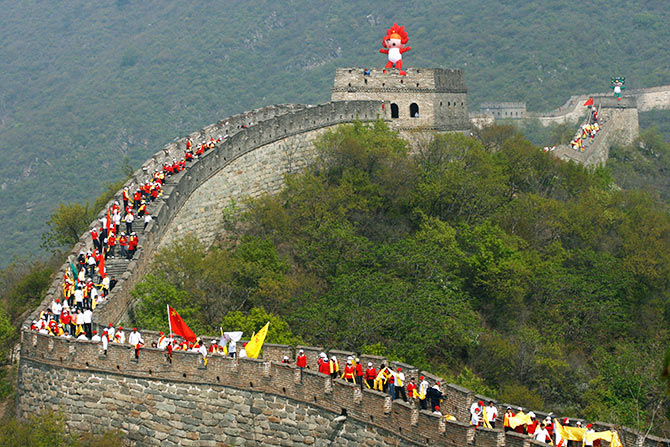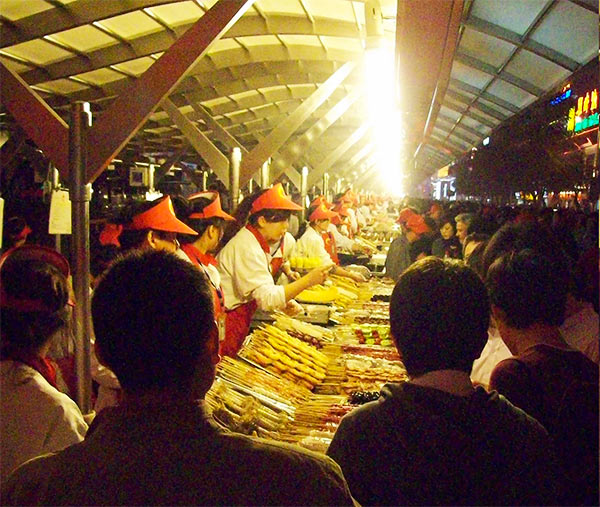Despite the language barrier, Beijing is a city where getting lost is not necessarily a bad idea

Photograph: Jason Lee/Reuters
Picture this. We have stumbled into Beijing one evening and have immediately set off to do what all tourists do there -- go shopping on Silk Street. It's a mind-numbing maze of shops that sell beautiful silks and knock-offs of every known brand on earth.
The bargaining is so intense that it puts an Indian subzimandi to shame.
My head is throbbing slightly, and I regret not having said no to wine on the flight. Just then, a shopkeeper thrusts his card into my hand. It reads and I quote, "Manage Item. Wholesale to Make to order. Craft drive. Depend on the mat. On the bed thing." My head begins to spin in earnest. The Chinese shall remain ever inscrutable to the rest of the world if Chinglish remains the only mode of communication, I muse.
Then I see shopkeepers simply punching prices on large calculators and thrusting them under unsuspecting noses. Money does speak a universal language, I muse as we eventually stumble out with armfuls of silk we haven't a clue what to do with, and a pair of fake branded shoes for our son -- both, as it transpires later, for the same foot.
Few people speak English in China, we learn over the next few days. The street signs, despite the 2008 Olympics hosted in Beijing, are all in Chinese, as are the ones in its spiffy metro (our host has to tell us the exact number of stops to our destination).
Google maps on our iPhones tell us exactly where we are -- in English.
We haven't a clue where we are in Chinese though. It's a curious feeling to feel this lost, and as we discover over the next few days, frustrating yet fun.
Mao's mausoleum on Tiannanmen Square After the crazy visit to Silk Street, we spend four hours (yes, four) wandering within striking distance of the Forbidden City, unable to find the entrance to it.

Photograph: Stringer/Reuters
Instead, we rest on the shores of Bei Hai, a lake flanking the Forbidden City and a popular local picnic spot. In spite of the sign by the lake's edge exhorting people to 'slip carefully', skaters and bikers move in disciplined lines while families bask in the crisp noonday sun.
Sadly, the next morning when we're slated to spend a day at the Great Wall is smoggy.
"You're lucky to have a smog-free day here," comments our host. Beijing's smog has grounded aircraft, closed roads, hit tourism and has cleverly survived bicycle promotions, tree plantation drives and more. We put on our masks (every well-dressed Chinese has one) and off we go, looking anonymous. Our host has recommended we access the Wall from Mutianyu, which is slightly further from Beijing but significantly less crowded. "It also has a surprise element you'll enjoy," he says mysteriously.
He writes down our destination in Mandarin to show the taxi driver, and consequently, for the first time in days, we're not lost and wandering around.

Photograph: China Daily/Reuters
Seventy kilometres northeast of central Beijing, the Mutianyu section of the Great Wall is very well-preserved. As we buy the tickets for the chair lift, we learn we can actually toboggan all the way down.
It seems incredible that a monument of such solemn historical importance as the Great Wall could have something as light-hearted as an amusement park ride. When we reach the top, the sheer vastness of the Great Wall exceeds our expectations.
On either side, as far as the eye can see, it goes up and down hilly promontories. In places it is a little more than a series of steep steps, in others, a broad avenue. We sit for a while in the shade to take it all in, and drink Mongolian beer that an old lady is selling in an old basket. As the sun reaches its zenith, we walk back slowly, unwilling to leave.
I turn back for a last look at the Wall before strapping myself into the toboggan. The wind whizzes past my ears as I fly down the mountain, the Great Wall swiftly receding in the distance.

Photograph: Samflash/Wikimedia Creative Commons
That evening, we decide to explore Donghuamen Food Street, the Mecca of street food in Beijing, on foot. It is a narrow, crowded lane, lit brightly with Chinese lanterns. Office-goers grabbing a bite before heading home stand cheek-by-jowl with gawking tourists. We gawk too -- at the live scorpions squirming on skewers next to trays of snakes, silkworms, dung beetles and grass hoppers waiting to be grilled. Tourists take millions of photographs next to all the skewered creepy crawlies, but I notice that locals are prudently eschewing this for steamed fish and meat dumplings smothered in a variety of sauces.
The dumplings are succulent, and I try each with a different sauce. Then I'm diverted by the sight of a man doing brisk business selling skewers of what seem to be small, glistening red hearts. "Chicken?" I ask, miming and squawking like one. They turn out to be candied strawberries. We buy a skewer amidst widespread merriment from the locals. I forget my embarrassment when I bite into the sticky fruit that we would have walked past if I hadn't decided to play Dumb Charades.
How much more have we not found, or lost in translation, during our week spent being so clueless in Beijing? I don't know. But as I lick the last of the strawberry juice off my fingers, I realise what a delicious change it is to be lost, instead of always knowing exactly where one has to go...

.jpg)









